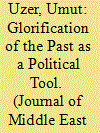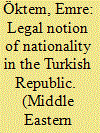|
|
|
Sort Order |
|
|
|
Items / Page
|
|
|
|
|
|
|
| Srl | Item |
| 1 |
ID:
090120


|
|
|
|
|
| Publication |
2009.
|
| Summary/Abstract |
Ottoman claims to universality - embodied in Ottoman imperialism, Ottoman Islam, and Ottoman cosmopolitanism - were undermined and ultimately shattered by the encounter with ascendant Europe. Following near-dismemberment after the First World War, Mustafa Kemal categorically rejected Ottoman universalism in favour of a non-irredentist, secularist nationalism. His brand of Turkish particularism shaped national identity and foreign policy for much of the twentieth century. Since the 1980s, however, a growing number of Turks have begun to revisit the Ottoman past. They are drawn to one or another of the three dimensions of Ottoman universalism which they use to make alternative national and foreign policy claims. This study provides a brief, schematic account of the later years of the Ottoman Empire and early years of the Turkish Republic in order to trace the metamorphosis of Ottoman universalism into Turkish particularism. It then explores how Kemalists, Islamists, liberals, and ultranationalists appropriate Ottoman universalism today in their attempts to redefine national identity and foreign policy.
|
|
|
|
|
|
|
|
|
|
|
|
|
|
|
|
| 2 |
ID:
163738


|
|
|
|
|
| Summary/Abstract |
Turkey’s radical transformation of state and society under Mustafa Kemal Atatürk’s republican rule (1923–1938) has been subject to a gradual revision under the Justice and Development Party (AKP) government since 2002. The creation of a new state identity has been buttressed with Islamic and Ottoman discourses, which entail a reinterpretation of Ottoman history. This study analyzes the changes in modern Turkey in the last sixteen years within the context of the use of the Ottoman past in the formation of a new national identity by the AKP government.
|
|
|
|
|
|
|
|
|
|
|
|
|
|
|
|
| 3 |
ID:
152610


|
|
|
|
|
| Summary/Abstract |
Shortly after its emergence, the Turkish Republic adopted legislation inspired by European legal systems and traditions, including a law on nationality. The implementation of this law was affected by the staunchly nationalistic early republican policies which were not immune from the influence of the concept of ‘race’, as well as by the Ottoman legal conceptions on nationality based on religion, both of which guided the application of the new laws by the judiciary and the administration. This article proposes a critical legal approach to the issue of Turkish nationality, based on historical reflections. After a survey on the laws on nationality since the foundation of the Republic, it addresses the major confusions in connection with the concept of nationality in the light of textbooks from the relevant period, in order to observe, in conclusion, inherent and insolvable inconsistencies within the law, and a tenacious survival of Ottoman conceptions within the current law on nationality, especially with regard to religious minorities, which are assimilated to dhimmis in the legal subconscious and often equated to foreigners in practice.
|
|
|
|
|
|
|
|
|
|
|
|
|
|
|
|
| 4 |
ID:
084681


|
|
|
|
|
| Publication |
2008.
|
| Summary/Abstract |
On 19 March 1877, the first Ottoman parliament opened at Dolmabahçe Palace when Sultan Abdülhamit II crossed a velvet carpet to stand beside a golden throne. Seen later as the finale of the Tanzimat reform era, the parliament appeared to diplomatic observers as the strategy of former grand vizier Midhat Pa?a. Midhat's constitutionalism was a plan for "reform, revival, and indeed survival" that included seeking allies against Russia and containing Russian influence in the Balkans. Abdülhamit listened as his secretary charged the new body: "The progress effected by civilised states, the security and wealth they enjoy, are the fruit of the participation of all in the enactment of laws and in the administration of public affairs." Among the most urgent priorities was "the development of agriculture and industry, and the progress of civilisation and of public wealth." Parliament later responded with a pledge to deliver the empire from its malaise, to "eliminate the last traces of abuses, the heritage of the regime of despotism."
|
|
|
|
|
|
|
|
|
|
|
|
|
|
|
|
| 5 |
ID:
092495


|
|
|
|
|
| Publication |
2009.
|
| Summary/Abstract |
The definition of Turkish nationhood after the founding of the Republic has been evaluated and labelled very differently by various scholars. The classical view paralleled the official representation of Republican policies in describing Turkish nationhood as being based on a civic and territorial understanding of nationality. More recent and much more critical scholarship, which enjoys a near-hegemonic position in the study of Turkish nationalism today, claims that the official definition of Turkish nationhood has a clearly identifiable mono-ethnic orientation, manifest in a series of policies and institutions. This article argues that the definition of Turkish nationhood as manifest in state policies is neither territorial nor mono-ethnic, but rather ironically for the adamantly secular Turkish republic, the definition of Turkish nationhood is mono-religious and anti-ethnic, in striking continuity with the Islamic millet under the Ottoman Empire. The reason critical scholars perceive Turkish nationhood as mono-ethnic might stem from the dichotomous view of nationalisms as civic versus ethnic, a dichotomy that has recently been repudiated by some of its erstwhile proponents. Supremacy of the religious over ethnic categories in Turkey, as a historical legacy of the Ottoman millet system, might be applicable to most post-Ottoman states in the Islamic Middle East and North Africa, in contrast to the interplay of ethnicity and religion in Western Europe. This view of Turkish nationhood is confirmed by a dozen interviews that the author conducted with members of the political and intellectual elite of different ideological orientations in Turkey. It is then demonstrated how the new efforts at reformulating modern Turkish identity with reference to Ottoman and Islamic conceptions lead to new inclusion-exclusion dynamics with the Kurds and the Alevis, suggesting that a truly inclusive reformulation has to follow secular and territorial principles.
|
|
|
|
|
|
|
|
|
|
|
|
|
|
|
|
| 6 |
ID:
156556


|
|
|
|
|
| Summary/Abstract |
Turkey is the only Eurasian state surrounded in almost a full circle by acute hot or “frozen conflicts,” ranging from low-intensity violence, terrorism to fully fledged wars. The prevailing pattern of intercommunal and interethnic conflicts in the continental Balkans and on Cyprus has long been different from those in the rest of Europe and in the Near East. This difference is closely related to the fact that these lands had experienced in the past centuries-long rule by the Ottoman Empire, whose legal successor is the Republic of Turkey. The intercommunal conflict potential in the rest of Europe used to differ substantially, but the difference has been greatly reduced as Western Europe has, in one respect, become “balkanized.”
|
|
|
|
|
|
|
|
|
|
|
|
|
|
|
|
| 7 |
ID:
159010


|
|
|
|
|
| Summary/Abstract |
On 25 July 1950, a month after the beginning of the Korean War, the newly elected Democratic Party (DP) in Turkey announced that a brigade would be sent to assist South Korea as part of the UN mission led by the United States. The main argument of this article is that although the DP regime is considered a secular and Kemalist one, the state continued the Ottoman tradition and practice of using Islam to gain support for the war and to mobilize the Turkish nation. To do so, the article will show the similarity of both the means and the content of religious propaganda used in the Korean War to those used in the Ottoman jihad in the First World War. This article suggests that parts of the public understood the war as a religious conflict and not just as an ideological one thus indicating the success of the religious messages and their efficiency.
|
|
|
|
|
|
|
|
|
|
|
|
|
|
|
|
|
|
|
|
|